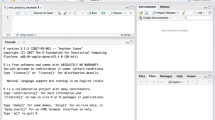Abstract
Contemporary experiments in Digital Humanities and distant reading tend to propose an empirical approach to literary facts. This development leads us to reflect on the place of quantitative analysis in literary theory, by asking whether data can replace literary theory in the age of Artificial Intelligence (AI)? By shifting from the status of emblematic fact to that of mere “noise” or statistical randomness in data, it is the entire theoretical conception of the literary work, supposedly individual and particular, that is called into question. This article attempts to reflect on these epistemological evolutions.




Similar content being viewed by others
Notes
This heterogeneity is controversial in many fields; this is particularly true of zoology, which is not free from the well-known opposition between theory and history among literary scholars. See on this point Mayr’s reflections and J.-P. Thomas’s synthesis (Lecourt, 1999).
On this technique: (Mimno, n. d.).
References
Archer, J. & Jockers, M. L. (2016) The bestseller code: Anatomy of the blockbuster novel. Macmillan. https://us.macmillan.com/books/9781250088284/thebestsellercode
Anderson, C. (2008). juin 23). The end of theory: The data deluge makes the scientific method obsolete. Wired. https://www.wired.com/2008/06/pb-theory/
Berthelot, J. M. (2016). Épistémologie Des sciences sociales. Presses Universitaires de France.
Boudon, R. (1968). A quoi sert la notion de « structure »? Essai sur la signification de la notion de structure dans les sciences humaine. Gallimard.
Cerisuelo, M., & Compagnon, A. (2023). (n. d.). Critique littéraire. Encyclopædia Universalis. Retrieved October 25, from https://www.universalis-edu.com/encyclopedie/critique-litteraire
Felski, R. (2020). Hooked: Art and attachment. The University of Chicago.
Genette, G. (2014). Palimpsestes: La littérature Au second degré. Editions du Seuil. http://catalogue.bnf.fr/ark:/12148/cb45335401z.
Lecourt, D. (1999). Taxinomie. In Dictionnaire d’histoire et philosophie des sciences (p. 913). Presses universitaires de France. http://catalogue.bnf.fr/ark:/12148/cb40198475f.
Moretti, F. (2005). Graphs, maps, trees: Abstract models for a literary history. Verso. http://catalogue.bnf.fr/ark:/12148/cb41019113m.
Mimno, D. (n. d.). Topic modeling bibliography. Retrieved October 25, 2023 from https://mimno.infosci.cornell.edu/topics.html
Schaeffer, J. M. (1989). Qu’est-ce qu’un genre littéraire? Éditions du Seuil. http://catalogue.bnf.fr/ark:/12148/cb35012967h.
Author information
Authors and Affiliations
Corresponding author
Additional information
Publisher’s Note
Springer Nature remains neutral with regard to jurisdictional claims in published maps and institutional affiliations.
Rights and permissions
Springer Nature or its licensor (e.g. a society or other partner) holds exclusive rights to this article under a publishing agreement with the author(s) or other rightsholder(s); author self-archiving of the accepted manuscript version of this article is solely governed by the terms of such publishing agreement and applicable law.
About this article
Cite this article
Gefen, A. The time of data. theoretical thinking, statistical thinking. Neohelicon (2024). https://doi.org/10.1007/s11059-024-00743-y
Published:
DOI: https://doi.org/10.1007/s11059-024-00743-y




